Break the Mould – the heroes behind the design
When we kicked off our collaboration with Hatch we had a very specific idea in mind. We wanted to celebrate and pay homage to a group of British people that broke the mould – creative, brilliant people that dared to stand out among their peers, who did things differently to the people before them, who changed the course of history through their ideas, imagination, creativity, will, hard work and contributions to society. It’s not exhaustive, of course, but it’s a pretty good start. And we knew Hatch’s completely unique style was the only way to bring this to life.
So here we thought we’d tell you a little more about the unique characters that feature on the Venus & the Cat indoor pot ‘Break the Mould’.

Mary Seacole (23 November 1805 – 14 May 1881)
Mary Jane Seacole was a healer and a doctress from Jamaica. A free woman, she wanted to assist with nursing the wounded on the outbreak of the Crimean War and applied to the War Office to be included among the nursing contingent. Seacole was refused, so acted on her own remarkable good will and travelled independently across the world to set up her "British Hotel" behind lines, tending to the battlefield wounded.
She described her 'Hotel' as "a mess-table and comfortable quarters for sick and convalescent officers", nursing a great many wounded servicemen on the battlefield back to health. Schools of nursing in England were set up after the Crimean war, the first being the (Florence) Nightingale Training School, in 1860 at St Thomas' Hospital in London. Seacole was notably the first nurse practitioner in the UK.
Seacole soon faced destitution after the war but her compassion for so many service personnel was repaid to her. In 1857 a four-day Fundraising Gala took place on the banks of the river Thames, to honour Mary Seacole. Crowds of around 80,000 attended, including veterans and their families as well as Royalty.
After her death Seacole was posthumously awarded the Jamaican Order of Merit in 1991. In 2004, she was voted the greatest black Briton in history. In 2016 a glorious statue of Mary Seacole was erected at St Thomas'.
Florence Nightingale (12 May 1820 – 13 August 1910)
Florence Nightingale is widely regarded as the founder of modern nursing. Nightingale came to prominence whilst serving as a manager and trainer of nurses during the Crimean War, in which she organised care for wounded soldiers. She became an icon of Victorian culture, in the persona of "The Lady with the Lamp", making rounds of wounded soldiers throughout the night.
Whilst Nightingale rose to prominence during the Crimean war, it is her subsequent impact that truly set her legacy. She was instrumental in professionalising nursing roles for women. In 1860, she laid the foundation of professional nursing with the establishment of her nursing school at St Thomas' Hospital in London (where Mary Seacole practiced after the war). It was the first secular nursing school in the world and is now part of King's College London. In recognition of her pioneering work in nursing, the Nightingale Pledge is taken by new nurses, and the Florence Nightingale Medal, the highest international distinction a nurse can achieve, was named in her honour. The annual International Nurses Day is celebrated on her birthday.
Her social reforms included improving healthcare for all sections of British society, advocating better hunger relief in India, helping to abolish prostitution laws and expanding the acceptable forms of female participation in the workforce.
Nightingale was also a prodigious and versatile writer, and a statistician by trade. In her lifetime, much of her published work was concerned with spreading medical knowledge, written in simple English and utilising her skills as a pioneer in data visualization and infographics, so that they could easily be understood by those with poor literary skills.





Leave a comment